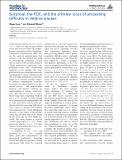| dc.contributor.author | Levy, Roger | |
| dc.contributor.author | Gibson, Edward A. | |
| dc.date.accessioned | 2013-09-03T15:51:26Z | |
| dc.date.available | 2013-09-03T15:51:26Z | |
| dc.date.issued | 2013-05 | |
| dc.date.submitted | 2013-02 | |
| dc.identifier.issn | 1664-1078 | |
| dc.identifier.uri | http://hdl.handle.net/1721.1/80342 | |
| dc.description.abstract | Of the ambitious purview of MacDonald's (2013) article, we find the part fleshed out in most concrete detail—the comprehension consequences of her Production-Distribution-Comprehension (PDC) theory, the easiest to comment upon. Such a theory as she has sketched out would be extraordinarily compelling: a theory that, in contrast with accounts relying on “innate parsing biases,” posits that “comprehension results reflect distributional regularities in the language” that “comprehenders are generating expectations for upcoming input,” places “emphasis on the role of learning probabilistic constraints,” makes use of “extensive language corpora” to “[permit] comprehension researchers to examine the relationship between production patterns … and comprehension behavior” and thereby “reframes our understanding of sentence comprehension.” The only way we can see such a theory being more compelling would be for it to be specified precisely enough to be computationally implementable and to make quantitative and localized predictions about the processing difficulty of every word in a sentence that could be tested rigorously on a variety of linguistic materials. A naïve reader of MacDonald's article may not know that such a theory already exists and has been highly successful. This theory, known as surprisal, was first proposed by Hale (2001), building on early ideas by Attneave (1959) from the dawn of information theory (Shannon, 1948) and cognitive science. | en_US |
| dc.language.iso | en_US | |
| dc.publisher | Frontiers Research Foundation | en_US |
| dc.relation.isversionof | http://dx.doi.org/10.3389/fpsyg.2013.00229 | en_US |
| dc.rights | Article is made available in accordance with the publisher's policy and may be subject to US copyright law. Please refer to the publisher's site for terms of use. | en_US |
| dc.source | Frontiers Research Foundation | en_US |
| dc.title | Surprisal, the PDC, and the primary locus of processing difficulty in relative clauses | en_US |
| dc.type | Article | en_US |
| dc.identifier.citation | Levy, Roger, and Edward Gibson. “Surprisal, the PDC, and the primary locus of processing difficulty in relative clauses.” Frontiers in Psychology 4 (2013). | en_US |
| dc.contributor.department | Massachusetts Institute of Technology. Department of Brain and Cognitive Sciences | en_US |
| dc.contributor.department | Massachusetts Institute of Technology. Department of Linguistics and Philosophy | en_US |
| dc.contributor.mitauthor | Levy, Roger | en_US |
| dc.contributor.mitauthor | Gibson, Edward A. | en_US |
| dc.relation.journal | Frontiers in Psychology | en_US |
| dc.eprint.version | Final published version | en_US |
| dc.type.uri | http://purl.org/eprint/type/JournalArticle | en_US |
| eprint.status | http://purl.org/eprint/status/PeerReviewed | en_US |
| dspace.orderedauthors | Levy, Roger; Gibson, Edward | en_US |
| dc.identifier.orcid | https://orcid.org/0000-0002-5912-883X | |
| mit.license | PUBLISHER_POLICY | en_US |
| mit.metadata.status | Complete | |
